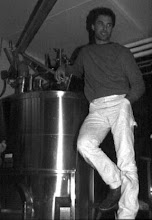=======================
I've been following this thread and thought I'd weigh in with some background on this topic. When my partners and I arrived in the Granite State in 1991 to open the Portsmouth Brewery, the alcohol limit for beer sold in the state was 6% abv. In 1995, the year after Smuttynose opened, I met with with our local state sentator and the director of the state's wholesale beverage association to discuss a number of possible changes to the state's beer laws, including raising the 6% limit. The wholesalers' representative thought raising the limit was a political nonstarter, since he was convinced the neo-prohibitionist lobby would crawl out of the woodwork to oppose it. We pressed ahead anyway, forming a group of small brewers and sympathetic legislators. After a good deal of discussion, it was decided that a 12% limit might be sellable, but we weren't even sure about that. (Politics, remember, is the art of the possible.)
As it turns out, organized opposition to the bill never materialized. During testimony, the thing many legislators were most curious about was how many great beers were not available in the state, due to the 6% limit. Commerce, it turns out, won the day.
Interestingly, in 2007 the wholesalers, who in 1996 were mildly opposed to raising the limit from 6 to 12%, brought forth their own bill proposing raising the limit to 15%, arising from their interest in selling high-octane flavored malt beverages. I didn't want to spend any of my own political capital promoting Mike's super-extra-hard lemonade, but I didn't want to pick an unnecessary fight with the wholesalers (with whom I've built a good, productive relationship), so I sat on my hands and didn't support or oppose this bill. My recollection is that the proposed 15% limit got reeled back to 14%, with the special approval provision added in.
So that's how we go to where we are at this point. And while I wouldn't discourage anyone from riding their ponies to the statehouse to exercise their rights of citizenship, I'll just point out that with respect to alcohol limits, at 14% most of the battle has been won. Any increases beyond that will be harder and harder to achieve, politically speaking, because the constituency served gets smaller and smaller.
There are lots of amazing beers that are not available in New Hampshire, and the alcohol limit has nothing to do with it. Our is a state whose retail landscape is dominated by three supermarket chains who favor big, nationally advertised brands. This fact influences the way our wholesalers do business: with relatively few retail outlets for truly specialized beers, they tend to shy away from them. If the readers of this forum are really interested in expanding the selection of beers in New Hampshire, the best place to focus their energy is not on the statehouse, but on the major retailers. Next time you are in a Hannaford, Shaw's or Market Basket, take a few minutes and drop a card in their suggestion box asking why many of your favorite beers are not available there.
===============================
A number of people participating on the forum expressed that legislation should be proposed to raise the 14% limit, or do away with it altogether. To them, I say go for it. However, I hope I don't sound too cynical by adding that it is far easier for a single individual to get in his or her car from time to time and drive to a store in Maine or Massachusetts to purchase beers unavailable in New Hampshire, than it is to become educated about the mechanics of legislation, draft a bill, locate sympathetic legislators, take time to travel to the state house to testify (sometimes multiple times), round up public support, persuade potential opponents to change their positions or at least keep quiet - in short to lobby for a change in the law that will benefit some consumers but have limited consequence in the grand scheme of things.
That is why, in my opinion, legislation of any kind is generally promoted by those who have a commercial stake in its passage (or defeat), because they are the only ones for whom it is worth devoting the time and resources required. Sadly, most of the time the voice of the consumer is absent from the discussion.
